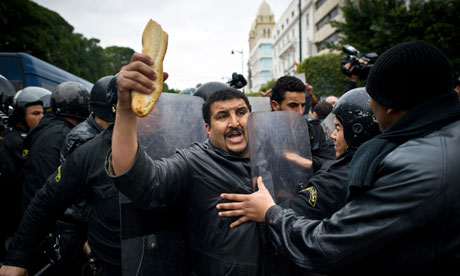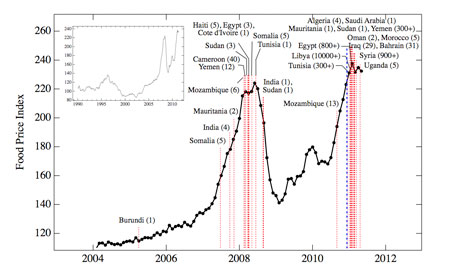
A Tunisian protester holding bread confronts riot policemen during a demonstration in Tunis on January 18, 2011. Photograph: Martin Bureau/AFP/Getty Images
Seeking simple explanations for the Arab spring uprisings that have swept through Tunisia, Egypt and now Libya, is clearly foolish amidst entangled issues of social injustice, poverty, unemployment and water stress. But asking "why precisely now?" is less daft, and a provocative new study proposes an answer: soaring food prices.
Furthermore, it suggests there is a specific food price level above which riots and unrest become far more likely. That figure is 210 on the UN FAO's price index: the index is currently at 234, due to the most recent spike in prices which started in the middle of 2010.
Lastly, the researchers argue that current underlying food price trends - excluding the spikes - mean the index will be permanently over the 210 threshold within a year or two. The paper concludes: "The current [food price] problem transcends the specific national political crises to represent a global concern about vulnerable populations and social order." Big trouble, in other words.
Now, those are some pretty big statements and I should state right now that this research, by a team at the New England Complex Systems Institute, has not yet been peer reviewed. It has been published because, Yaneer Bar-Yam, NECSI president, told me, the work is relevant now but peer review is slow.
The first part of the research is straightforward enough: plotting riots identified as over food against the food price index. The correlation is striking, but is it evidence of causation?
 The UN FAO food price index correlates with "food riots" around 2008 and the "Arab spring" conflicts. Death tolls are reported in parentheses. Graph: New England Complex Systems Institute Bar-Yam says this conundrum can be tackled by asking the question in clear ways. Could the riots be causing high food prices, rather than the reverse? No, the former is local, the latter global. Could the correlation simply be a coincidence? Yes, there's only a tiny chance of that, Bar-Yam's team argues in the paper.
The UN FAO food price index correlates with "food riots" around 2008 and the "Arab spring" conflicts. Death tolls are reported in parentheses. Graph: New England Complex Systems Institute Bar-Yam says this conundrum can be tackled by asking the question in clear ways. Could the riots be causing high food prices, rather than the reverse? No, the former is local, the latter global. Could the correlation simply be a coincidence? Yes, there's only a tiny chance of that, Bar-Yam's team argues in the paper.
Lastly, could other factors be causing both the violence and the high food prices? "No-one has suggested any other factor that can do both," says Bar-Yam. For example, oil and tin both show similar price patterns to that of food, but seem unlikely to prompt the violence. The similarity, says Bar-Yam, is because all the commodity price peaks are being driven by speculation in global markets.
So far, so convincing, as far as I can tell, though do tell me in the comments below if you think differently. The next part of the study identifies that the serious unrest in North Africa and the Middle East also correlates very closely with a food price spike. Bar-Yam also notes: "Several of the initial riots in North Africa were identified in news stories as food riots." From there, the researchers make their prediction of permanently passing the 210 threshold in 12-24 months.
As with the story I wrote yesterday, about the statistical work demonstrating a clear link between civil wars since 1950 and the global changes in climate caused by El Niño cycles, this is a fascinating area of research.
As Bar-Yam's paper puts it: "Our analysis of the link between global food prices and social unrest supports a growing conclusion that it is possible to build mathematical models of global economic and social crises. Identifying a signature of unrest for future events is surely useful."
Surely indeed. Bar-Yam submitted a report to the US government identifying the risk of social unrest and political instability due to food prices on 13 December 2010. Four days later Mohamed Bouazizi, set himself ablaze in protest at being unable to make a living selling fruit and vegetables, the event seen as triggering the first Arab uprising.
There is a risk that the apparent precision of these statistical approaches distracts from the real human suffering underlying them. They must not. But if such tools can raise red flags to alert responsible authorities to looming problems, and help prompt action, that surely cannot be bad.
taken from http://www.guardian.co.uk/environment/damian-carrington-blog/2011/aug/25/food-price-arab-middle-east-protests
Furthermore, it suggests there is a specific food price level above which riots and unrest become far more likely. That figure is 210 on the UN FAO's price index: the index is currently at 234, due to the most recent spike in prices which started in the middle of 2010.
Lastly, the researchers argue that current underlying food price trends - excluding the spikes - mean the index will be permanently over the 210 threshold within a year or two. The paper concludes: "The current [food price] problem transcends the specific national political crises to represent a global concern about vulnerable populations and social order." Big trouble, in other words.
Now, those are some pretty big statements and I should state right now that this research, by a team at the New England Complex Systems Institute, has not yet been peer reviewed. It has been published because, Yaneer Bar-Yam, NECSI president, told me, the work is relevant now but peer review is slow.
The first part of the research is straightforward enough: plotting riots identified as over food against the food price index. The correlation is striking, but is it evidence of causation?
 The UN FAO food price index correlates with "food riots" around 2008 and the "Arab spring" conflicts. Death tolls are reported in parentheses. Graph: New England Complex Systems Institute Bar-Yam says this conundrum can be tackled by asking the question in clear ways. Could the riots be causing high food prices, rather than the reverse? No, the former is local, the latter global. Could the correlation simply be a coincidence? Yes, there's only a tiny chance of that, Bar-Yam's team argues in the paper.
The UN FAO food price index correlates with "food riots" around 2008 and the "Arab spring" conflicts. Death tolls are reported in parentheses. Graph: New England Complex Systems Institute Bar-Yam says this conundrum can be tackled by asking the question in clear ways. Could the riots be causing high food prices, rather than the reverse? No, the former is local, the latter global. Could the correlation simply be a coincidence? Yes, there's only a tiny chance of that, Bar-Yam's team argues in the paper.Lastly, could other factors be causing both the violence and the high food prices? "No-one has suggested any other factor that can do both," says Bar-Yam. For example, oil and tin both show similar price patterns to that of food, but seem unlikely to prompt the violence. The similarity, says Bar-Yam, is because all the commodity price peaks are being driven by speculation in global markets.
So far, so convincing, as far as I can tell, though do tell me in the comments below if you think differently. The next part of the study identifies that the serious unrest in North Africa and the Middle East also correlates very closely with a food price spike. Bar-Yam also notes: "Several of the initial riots in North Africa were identified in news stories as food riots." From there, the researchers make their prediction of permanently passing the 210 threshold in 12-24 months.
As with the story I wrote yesterday, about the statistical work demonstrating a clear link between civil wars since 1950 and the global changes in climate caused by El Niño cycles, this is a fascinating area of research.
As Bar-Yam's paper puts it: "Our analysis of the link between global food prices and social unrest supports a growing conclusion that it is possible to build mathematical models of global economic and social crises. Identifying a signature of unrest for future events is surely useful."
Surely indeed. Bar-Yam submitted a report to the US government identifying the risk of social unrest and political instability due to food prices on 13 December 2010. Four days later Mohamed Bouazizi, set himself ablaze in protest at being unable to make a living selling fruit and vegetables, the event seen as triggering the first Arab uprising.
There is a risk that the apparent precision of these statistical approaches distracts from the real human suffering underlying them. They must not. But if such tools can raise red flags to alert responsible authorities to looming problems, and help prompt action, that surely cannot be bad.
taken from http://www.guardian.co.uk/environment/damian-carrington-blog/2011/aug/25/food-price-arab-middle-east-protests

No comments:
Post a Comment